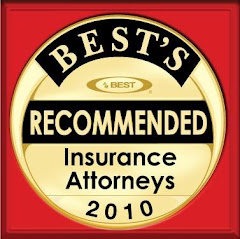The Connecticut Appellate Court released it's decison on December 1, 2009 in the case of
MARJORIE VORONUK v. ELECTRIC BOAT
CORPORATION ET AL.
Voronuk concerns a claim for survivor's benefits under section 31-306 of the Connecticut Worker's Compensation Act.
According to the decision, Joseph Voronuk, the plaintiff’s late husband, who died in 1995,
testified by deposition on November 14, 1989, that he
first worked for the defendant in 1942 as a shipfitter
for approximately six months to one year and that during
that period he was exposed to asbestos while on
the job. He and the plaintiff were married in 1947 and
remained married and living together until his death.
He resumed employment with the defendant in 1951
as a carpenter. He testified that in the course of his
employment as a carpenter for the defendant he was
exposed to asbestos. He testified that in 1982, due to
complaints of chest pain, he was examined by Paul
Gerity, a physician. Gerity’s notes of the examination
reveal that the decedent was fearful that his prolonged
exposure to asbestos on the job made him susceptible
to asbestosis. The decedent’s medical records show
that from October, 1982, through April, 1986, he was
treated by Gerity and William G. Crawford, another
physician, for, among other things, complaints of chest
pain. The decedent also testified that in 1985, at the
defendant’s request, he had a medical screening for
asbestosis performed by personnel at Boston University
Medical Center. It was as a result of this medical screening
that he first learned of his diagnosis of asbestosis.
On March 17, 1986, he filed with the commissioner a
form 30-C, claiming that his lung disease was a result
of workplace exposure to lung irritants. The decedent
retired from the defendant’s employ in 1986.
The decedent thereafter continued to monitor and
to treat his lung condition, although it worsened. In
September, 1993, he was hospitalized and diagnosed
with congestive heart failure, cardiomyopathy, asbestosis
and chronic obstructive pulmonary disease. He was
again hospitalized in July and November, 1994, due to
complications resulting from congestive heart failure,
pleural effusions, cardiomegaly, chronic obstructive
pulmonary disease, hypoxia and asbestosis. He died
on October 13, 1995. His death certificate listed the
immediate cause of death as cardiorespiratory arrest
due to cardiomyopathy and congestive heart failure.
It also listed diabetes mellitus as another condition
contributing to death but not related to cause.
In
1996, Mark R. Cullen, a physician, reviewed the decedent’s
medical records and prepared a report that the
plaintiff submitted to the commissioner. Cullen’s report
initially set out the basis for the opinions contained
therein and concluded: ‘‘Putting all the above information
into context, it would bemy opinion that underlying
restrictive lung disease was a contributory factor in the
development of cardiorespiratory failure which ultimately
caused [the decedent’s] demise in 1995. Since
his interstitial lung disease was due to asbestosis, I
would consider his work exposure contributory to his
death.’’ This report, along with the death certificate, was
the only evidence the plaintiff submitted concerning
the cause of the decedent’s death.
The Trial Commissioner, after hearing all of the evidence, concluded that because no expert medical opinion was profferred by the widow that Mr. Voronuk's past exposure to asbestos in his work at E.B. was a "substantial contributing factor, " she had not met her burden of proof with regards to establishing compensibility. The Compensation Review Board affirmed the trial commissioner, and now the Appellate Court has concluded likewise.
The Court goes out of its' way to state that it does not consider the expression "substantial contributing factor" to be a magic phrase, per se, however that conclusion is hard to escape.
The take away message is that when in doubt, the wise claimant's attorney should ask doctor for clarification of any ambiguous opinions. Schedule an hour of the doctor's time and explain to him or her what it is that is needed. Have an honest discussion about the medical legal implications of the doctor's opinions. With
Voronuk on the books, we have been forewarned.







